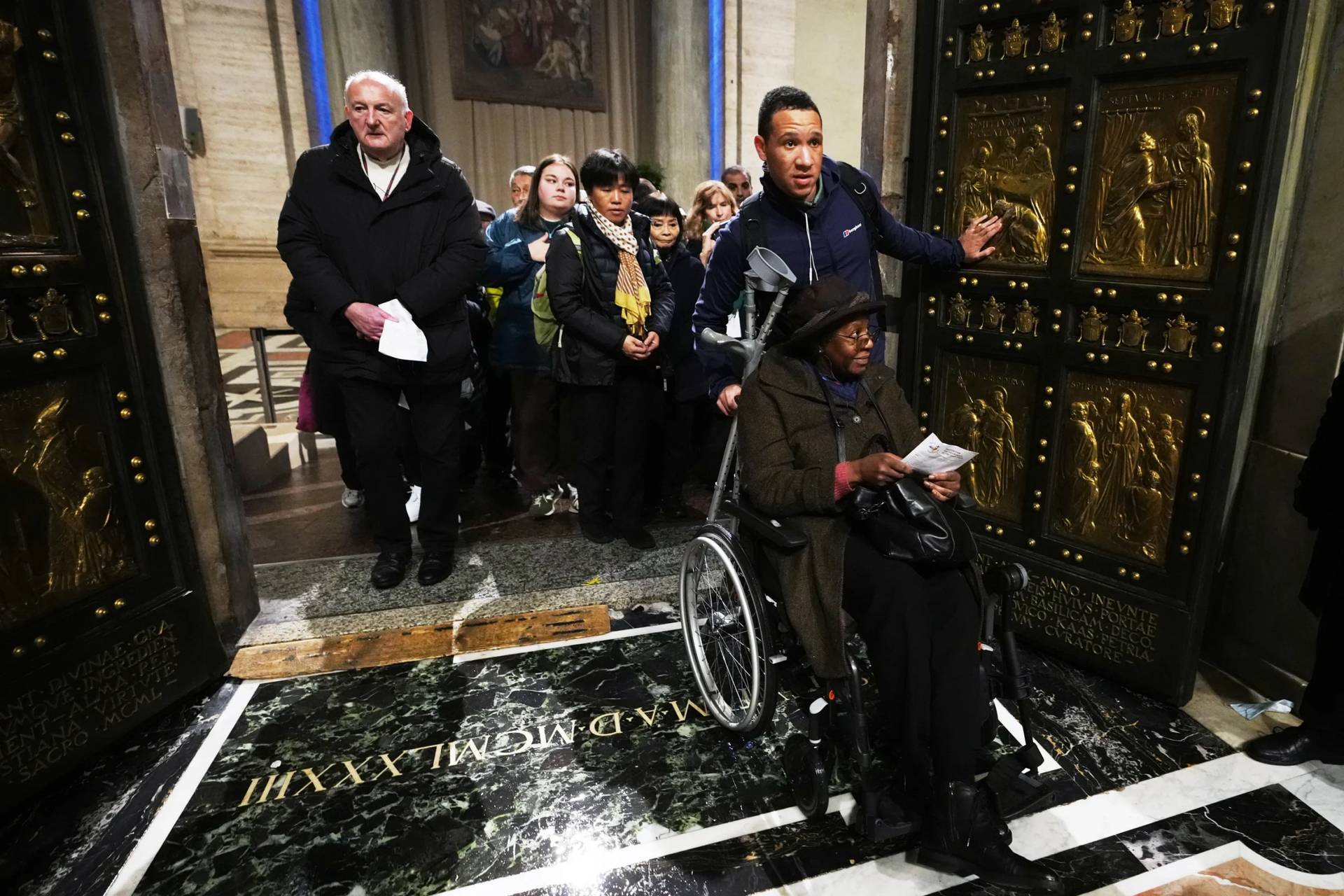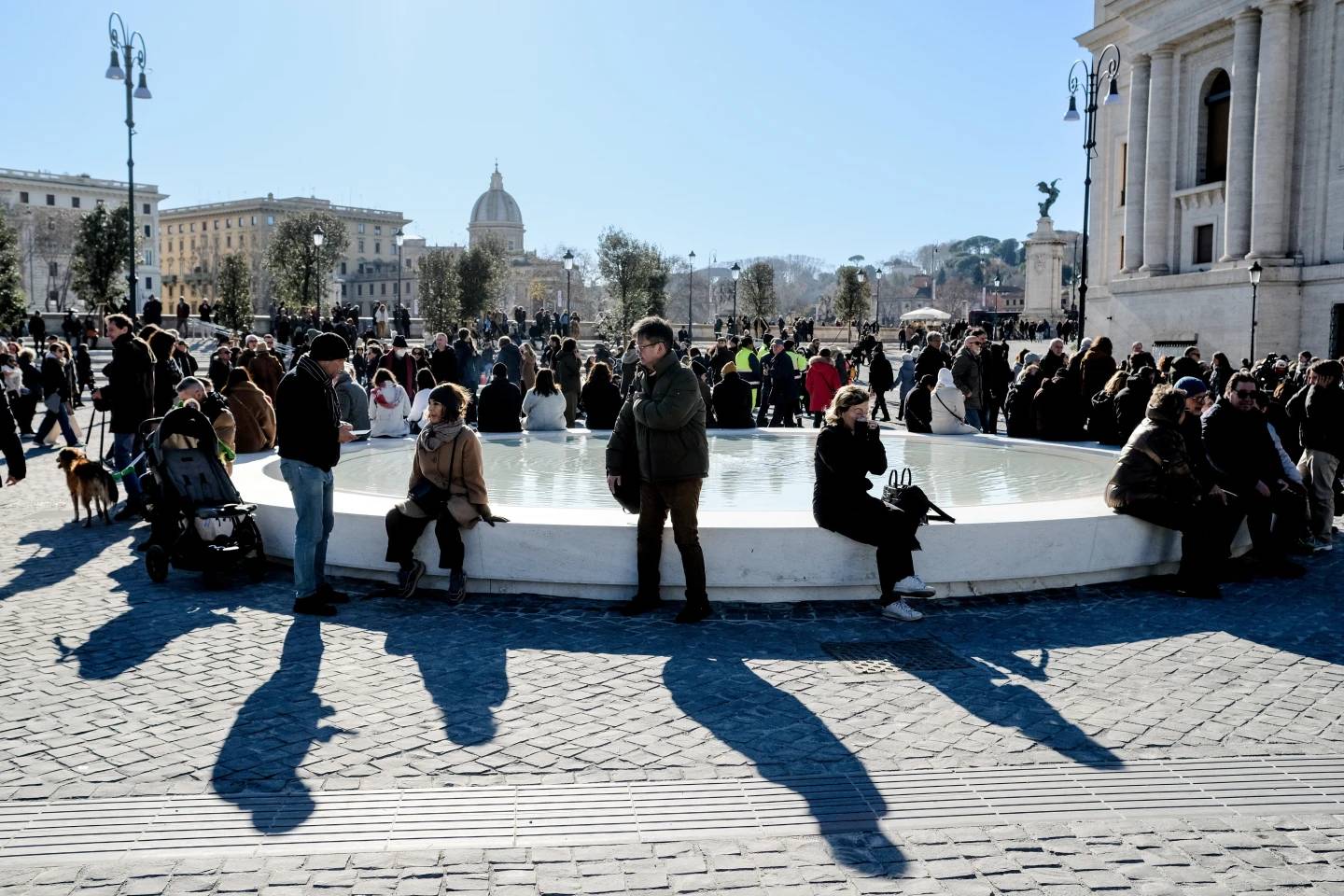ROME – After video-linking into space on Thursday, Pope Francis reached out to school children in the United States, Puerto Rico, Mexico, Paraguay and Argentina.
Addressing so-called “Dreamers” in the United States, the pope said he’s close to them in his prayer, and urged them not to hate anyone.
“The first thing I tell them is that I pray for you and I’m close to you,” Francis said, speaking to a group of children from Houston, after being asked by the master of ceremonies to send a message to them. “Second, keep on dreaming. Third, get close to the people who wish you well and who can defend you in this juncture. Don’t hate anyone. Look for support in the people who can defend you. I pray for you.”
Dreamers are young sons and daughters of immigrants, who arrived in the United States illegally before turning 16, and who are now working or studying in the country legally. Most Dreamers come from Mexico, El Salvador, Guatemala and Honduras. The largest numbers live in California, Texas, Florida and New York.
Earlier this year President Donald Trump announced that he was scrapping DACA, the federal government program created in 2012 under President Barack Obama which allowed Dreamers to stay in the United States.
Francis said that the American bishops keep him updated on their situation and the suffering they’re going through.
“I know that many people help you, and that there are people who don’t want you,” Francis said, before sharing that he too is the son of immigrants, and had it not been for the fact that someone helped his father when he arrived in Argentina at the age of 22, “I wouldn’t be here today.”
The pope also said that one of the nicest things is to welcome a new culture that comes from somewhere else, be enriched through dialogue with that culture, and welcome the other.
“And it’s not me who says this, someone much more important than I said it: God said it, and in the Bible it’s clear. Welcome the migrant, the refugee, because you were a migrant and refugee in Egypt,” he said. “Jesus, too, was a refugee.”
Speaking to the American people, he urged them to take care of migrants, who are the “promise for the future.” Then speaking to the newcomers, he urged them to do the same, take care of the people that welcome them, and to abide by the local laws and learn the language.
Addressing the European continent, he urged the inhabitants to remember that the continent is “mestizo,” built from many immigration waves, such as the barbarians and the Vikings. “This is not the moment to [be] sterilized laboratories. It’s time to welcome, hug; and those who are coming, respect the conditions of the people that welcome you.”
The encounter was organized by Scholas Ocurrentes, a canonical foundation that began to take shape 20 years ago in Argentina, when Francis was still Archbishop Jorge Mario Bergoglio of Buenos Aires.
RELATED: Pope to youth: Share your lives, or you’ll end up in a museum
Pedro García, a 9-year old born in Michoacán, Mexico, who’s living in Houston, asked the pope “Why did God create hurricanes and strong rains if he loves us all?”
“There are questions that have no response,” Francis said, echoing similar answers he’s given when asked about children suffering. “There are questions that can only be answered with solidarity, with a hug, and by accompanying those who suffer or going through a moment like the one you’re going through.”
The pope said that honestly, despite having studied theology and philosophy, he never knows how to respond to these questions. There’s only one explanation, he said, and that’s the crucifix.
“Why did God allow for his Son to be crucified? There’s only one response, because there’s so much love,” he said. “Behind a hurricane, behind every cross, is always the love of God.”
Many of the children in Houston speaking to the pope lost their homes to Hurricane Harvey, which killed as many as 60 people, dumped more than 50 inches of rain on the city, destroyed over 200,000 homes, and caused around $180 billion in damage.
The pope, known for his care for creation – and the man behind Laudato Si’, the first ever papal encyclical on the environment – also wondered if the hurricanes and earthquakes that are happening around the world are “natural events, or are we partially contributing” for not taking care of the environment.
“I would say that it’s part nature, part us,” he responded. “But it’s true that we’re responsible for many of the things that are happening in nature. We have to take care of nature.”
Some of the youth the pope spoke with were in Rome with him. Among those were Nahuel and Sandra, from San Antonio de los Cobres, a village in northern Argentina with a population of around 5,000 people. Over the past few months, over 30 young people committed suicide by jumping off a bridge.
As part of the Scholas Occurrentes project, the young people of the town got together and repainted the bridge, turning this “place of death into one of life,” according to Nahuel. At the pope’s request, Sandra brought one of the paint brushes used to give color to the bridge.
“To change the world, you need very little: The heart,” Francis said. “A paint brush was capable of giving life to a bridge of death only because [the initiative] was guided by a heart.”
He also told the youth to urge their friends to take care of their hearts, “the most beautiful thing God has given you.”
Also with him in Rome were two children from Israel and Palestine. One of them spoke about those who are “fortunate and unfortunate,” the latter being those who haven’t been able to receive an education due to the division in Jerusalem. At a Scholas event in Israel, they decided to create a school on a bus, capable of going through the check-points that divide one community from the other.
Speaking to them, Francis applauded their ability to come together despite “being loaded down by histories, histories of war.” The young people, he continued, had the “courage” to come together, when adults have become “used to these sad stories,” and to the “pessimism of saying ‘it can’t be done.’”
Joaquin, an 8-year old from Mexico, whose school and home were turned to rubble by the two deadly earthquakes that recently hit the country, struck a note of humor during the afternoon, saying he didn’t know what he wanted to tell the pope, but that he was “open to suggestions.”
As is usual in the events organized by Scholas Occurrentes, Francis was presented with different projects, reports and gifts before and after his dialogue with the children. This time, it included a report by the International Foundation for Democracy titled “Behind the Passion,” denouncing the shadow of modern day slavery and corruption hidden behind soccer, focusing particularly on the 2022 World Cup, scheduled to take place in Qatar.
According to the report – that has the support of Nobel Peace awardees Adolfo Perez Esquivel, Lech Walesa and Rigoberta Menchu – around 2,000 people have died building the stadiums for the soccer championship. It also questions the process that led the to the Middle Eastern country being chosen to host the event.















